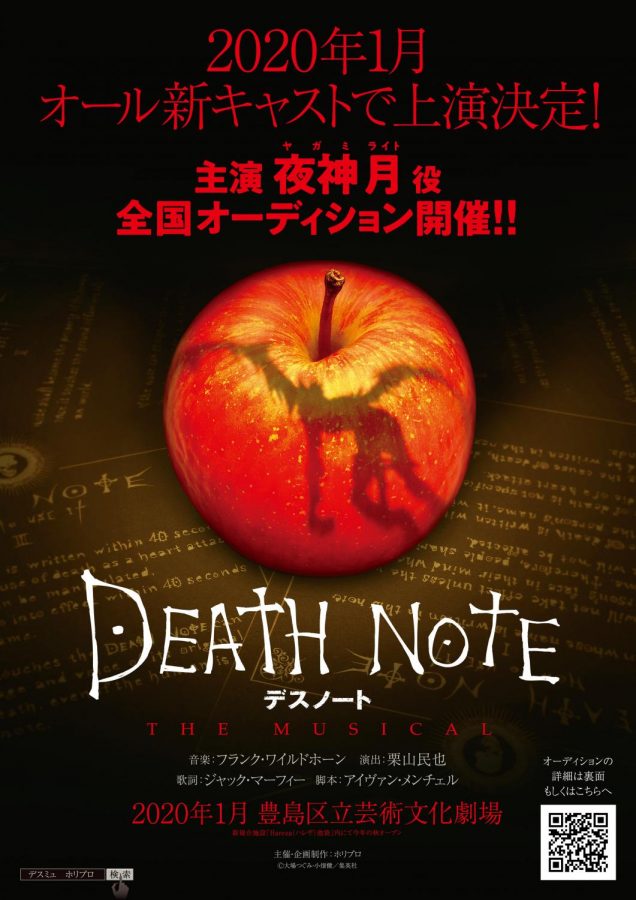Top 5 Songs from the Death Note Musical
Nov 16, 2020
The “Death Note the Musical” is a musical version of the popular anime “Death Note”. It’s about a young man named Light Yagami who happens to find a Death Note one day, dropped into the human realm by a Shinigami (God of Death) named Ryuk. Light realizes the notebook’s power and decides to use it to cleanse the world of evil, killing criminals. However, these serial killings get the attention of super detective L, who sets out to find the newly dubbed Kira and bring him to justice. The story is filled with many twists and turns, as Light and L seem evenly matched in intellect. Each time one gets the higher ground, the other steals it away just as quickly. I highly recommend the anime itself, as well as the musical.
1. Stalemate
The song stalemate takes place as L and Light meet for the first time in the college assembly. L is sure Light is Kira, and as part of his plan to prove this, he reveals himself to Light. He notices how Light doesn’t seem rattled by this revelation and acknowledges how good of an actor Light is. He plans to use trickery to out him but isn’t sure how to go about that as Light seems so good at adapting. Light however realizes what L is trying to do. However, Light can’t do anything about L, as he has introduced himself with the name of a popular idol. If Light tries to write his name in the Death Note and accidentally thinks of the idol, L would know immediately that it was him. Therefore Light also finds himself in a stalemate with L, neither of them sure how to move forward.
Near the end of the song, Misa interjects with a verse on her devotion to Kira, revealing she wrote a new song filled with ‘hidden clues’ only Kira would get. Light ends up singing over her, foreshadowing how he continues to brush her off over and over, seeing her as a burden (which, let’s be honest, she ends up being). The song is sung from the alternating perspectives of Light and L, or ‘evil’ and ‘good’. However, the labels of good and evil are highly interchangeable, as both are being both good and evil in their own ways. During the actual musical when this song is sung, Ryuk is seen making a ‘tie’ gesture, foreshadowing how this all ends in a tie; L being killed indirectly by Light, and Light being killed by Ryuk. An interesting stylistic choice within the song is how L seems to always have higher-pitched lyrics, alluding to his ‘higher moral ground’. Another interesting stylistic choice is the fact that in the end, L says ‘lose or win’ instead of ‘win or lose’, alluding to how he uniquely thinks about things.
2. Hurricane
This song is sung near the beginning of the Musical when Light first realizes how much power he holds with the Death Note. He’s just written the name of a criminal and seen him die, finally realizing the Death Note isn’t some prank. He knows he has God-like power, and instantly develops a God Complex (which the song references often). He even goes so far as to say he will become ‘The God of the New World’, which would have no criminals or crime. Later in ‘Kira’, Ryuk shows that he thinks this is stupid, as Light has no long-term plans – what would happen after his death? Light shows his distaste for criminals by going so far as to call them human stains, which he will wipe out as a hurricane would. The fact that he compares himself to a hurricane, one of the strongest natural disasters, could be seen as a reference to his God Complex. As he talks about there finally being justice, it can be seen as a callback to earlier song ‘Where is the Justice’, where he is angry over the lack of justice in the world. He also references how there will finally be less talking and more action.
3. The Way it Ends
This is sung near the end when L is realizing he’s going to die. He realizes this fact as he feels he is being controlled, which is something Kira can do to his victims before they inevitably die. L also references feeling like a character in a play, sort of a callback to ‘Stalemate’, where he makes the same comparison about him and Light/Kira. Not only that, but he also compares acting differently to bad code, revealing that since he now is sure Light is Kira, he feels his first and only friend betrayed him, even though he knew it was coming. This alludes to how he is once again isolated from everyone else. L asks himself how he couldn’t’ve seen this outcome coming, as he’d tried to always be a step ahead. He would have won had Light not had assistance from a Shinigami. Light admits to having only won since he got Rem to write L’s name to protect Misa, killing herself in the process. He then indirectly says that he saw L as an equal. L refers to his thoughts as cloudy, comparing them to a ‘camera’s cloudy lens’. He also says it’s taking ‘darker pictures’, referencing how he knows he’s going to die before catching Kira, which saddens him (and all the viewers). Light picks up as if it were a conversation, saying that L must now realize Light’s been playing him the entire time by saying that he must know he’s simply a ‘pawn upon aboard’.
Later he also says he only kept L alive so he could ‘play his part’, showing that he was always one step ahead. As if bragging, Light mentions how he was able to beat L, aka acquiring his real name, without having to make the Shinigami Eye Deal and slice his lifespan in half to be able to see it. Near the end, L says that he’s seen through Lights act since the beginning. Light says he was just using L, to which L responds by saying he won’t get away. Light laughs at him, saying that since L’s going to die, he’s won. Light then mocks L by saying that he must wish he had an extra minute of life, as he was about to prove Light was Kira before he died. An interesting stylistic choice; the singer for Light changes his voice for the last line of the song, from the arrogant voice he uses for all Kira lines to a sad, solemn one which shows Light cared for L and is sad that he had to die. It was clear from the beginning Light and L saw each other as friends, while Kira and L saw each other as rivals. In the end, Kira was simply more important, and L had to die.
4. Where is the Justice
This is the first actual song that is sung. In it, Light fights with his teacher about the justice system. He’s literally asking where the justice is. Light talks about how broken the system is, and how money can essentially buy innocence. He makes fun of the phrase ‘law and order’, saying that there is no order, just law, and broken law at that. He wants a justice system where right and wrong are clear, no grey in-betweens or possibilities of lawyers making a guilty man seem innocent. The teacher talks about there being grey areas in the law, and Light tells him that they should ‘drain the color’ so that it’s just black and white. He asks “What good is law that can’t punish those who break it?”. The teacher tells Light that overcomplicated declarations won’t make a difference. The irony in this statement is that he says this in the most complicated way possible. Light keeps defending the victims, turning into a sort of Robin Hood. This ends up shifting horribly by the end of the musical, however, leaving him a sort of twisted rendition instead of the kind Robin known in the story. In the end, the rest of the students in the class back him up. Personally, I agree with Light on the fact that the justice system isn’t great.
5. There are Lines
The song begins with Chief Yagami expressing his dissatisfaction with certain tactics L’s using. He begins by saying that you shouldn’t cross certain lines, or you’ll lose a piece of yourself. This is ironic, as Light has already lost himself to Kira. He also says that there are certain lines that lawmen shouldn’t cross, as they aren’t morally correct for the law. Then he references how you can’t sacrifice a life for a clue, referring to how L sacrificed an inmate on Death Row to find out a simple clue about Kira. He doesn’t think L is being very morally correct, but also partially blames this on Kira, saying that it’s Kira’s fault L has to be so ruthless. Light answers him as if they were in a conversation; and throughout the song, he is manipulating his father into letting him onto the Task Force.
He seems to agree with everything his father is saying, but if you read between the lines he is twisting the meanings of his words or not even really agreeing. Chief Yagami makes fun of a few popular phrases like ‘The end justifies the means’, ‘Set a thief to catch a thief’, and ‘Eye for eye’, saying they aren’t morally correct and shouldn’t be used. An interesting stylistic choice near the end is when Light chooses to sing in between his father’s lines instead of with them, showing he’s already crossed those lines. Another interesting stylistic choice is when Light avoids repeating the phrase about not loading a gun, as he’d make a similar allusion in his earlier song “Hurricane”, except he’d said that it was ok to do so. He does however repeat the part about not closing your eyes, as he believes you must aim. Yet another interesting stylistic choice is when in the end, Light’s voice ends up overpowering his fathers, as it’d been getting louder and louder with each phrase he twisted. It shows how he’s already too far gone, and he’s completely disobeyed his father.




